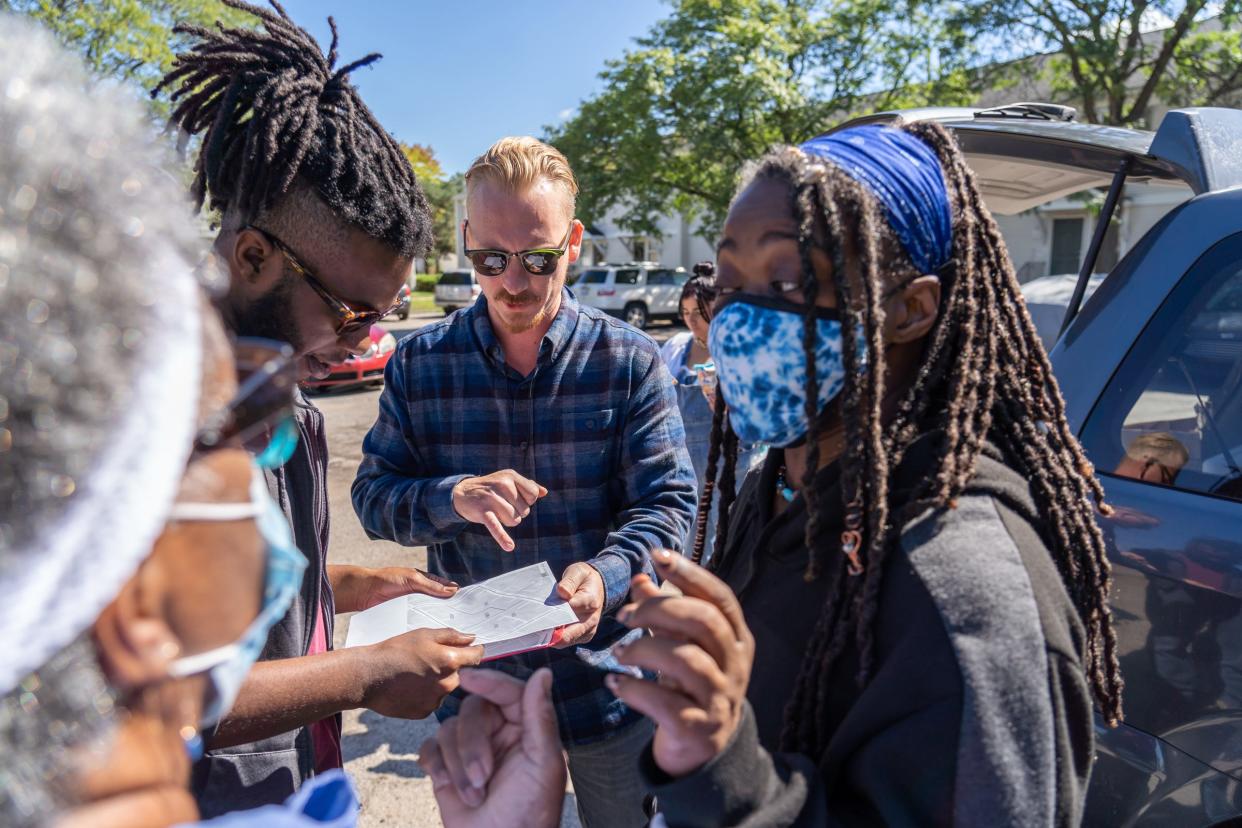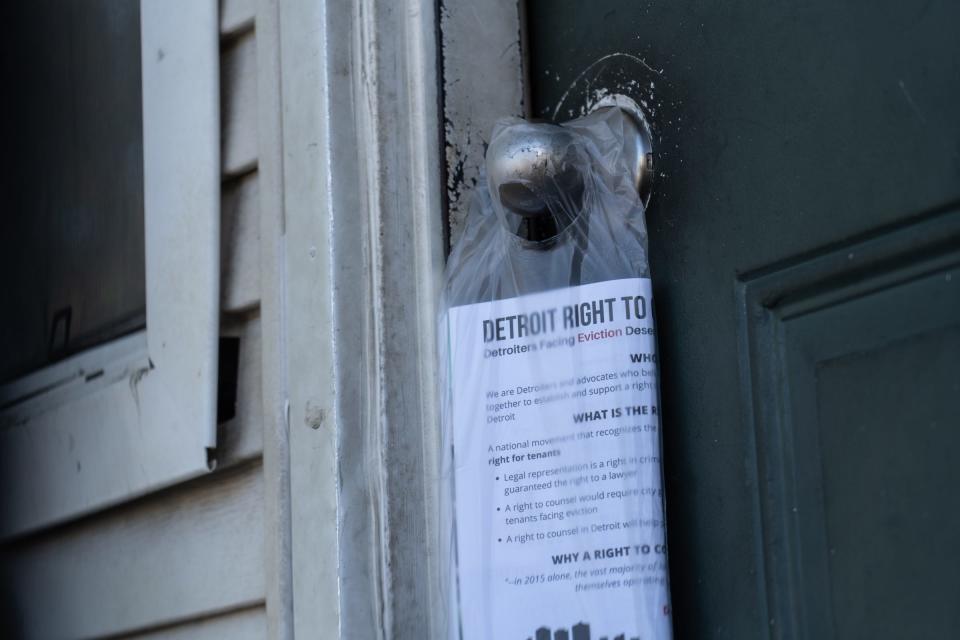Free legal help on the way for low-income Detroiters facing eviction

Detroit City Council on Tuesday unanimously passed an ordinance that provides free lawyers for low-income Detroiters facing eviction.
It's a move advocates say is a major step forward in a city where tens of thousands of eviction cases were filed each year and where most tenants didn't have legal representation compared with landlords, before the COVID-19 pandemic.
"I believe that this is about stabilizing our neighborhoods. It's about protecting our most vulnerable and I'm glad that we are here today. This is a historic day in Detroit," said Council President Mary Sheffield, who led the effort, alongside a coalition of nonprofit and grassroots organizations. It's been in the works for three years, she said.

More: Detroit City Council wants statewide housing agency to speed up rent aid applications
More: A new proposal would offer legal representation for Detroiters facing eviction
The ordinance provides legal representation for residents with incomes below 200% of the federal poverty guidelines — or a person making $27,180 — who are facing eviction or involved in other proceedings, such as mortgage and property tax foreclosures, in 36th District Court.
The program would initially be funded by $6 million in American Rescue Plan Act dollars, from a total pot of $18 million over three years that the council earmarked in a closing resolution last month. A philanthropic commitment of $12 million, over three years, also is expected to be announced soon.
Hassan Beydoun, senior adviser and counsel for Mayor Mike Duggan, on Tuesday said the administration has been working extensively with council to address several issues "and the version in front of you today reflects that collaborative effort."
The revised ordinance "allows the city to provide these critical services to those who need them the most in a fiscally responsible way with sustainable funding, not just in this year, but hopefully in the years to come," he said.
Several people, including tenants and leaders of nonprofit legal aid groups, spoke during public comment in support of the ordinance.
Ted Phillips, longtime executive director of the Detroit-based United Community Housing Coalition, said attorneys make a difference in land contract forfeiture cases where people face losing thousands in equity of their property.
His group provides a broad range of housing services, including legal counsel and relocation services.
"The greatest hurdle we've all had — all of the agencies doing this — has been funding over the years," he said.
Council members Gabriela Santiago-Romero and Scott Benson raised questions about long-term funding sources.
"The opinion of the corporation counsel's office now is that we are not going to be able to use general funds for this particular purpose," said Conrad Mallett, the city's top lawyer.
According to the ordinance, the city can use legally available "county, state, or federal funds," including American Rescue Plan Act dollars, to establish and fully implement the program through 2026. After then, the city "is authorized, subject to approval and appropriation by City Council, to utilize any funds as permitted by law."
Phil Neuman, legislative co-chairperson for the Detroit Metropolitan Apartment Association and an attorney representing landlords in 36th District Court and other courts, on Monday said that he's not opposed to the idea of providing lawyers for low-income tenants.
"While I certainly agree that low-income tenants should have a right to representation, I don't want that to impact the ability of the landlord to get their day in court," he said.
He's concerned that the ordinance could make the court process lengthier and cause delays for landlords, in "an already slow system," as cases get adjourned.
"My fear is that the backlog will grow larger due to delays in obtaining counsel for the people described as covered individuals in the ordinance," he said.
Landlords with more properties may be able to "absorb" financial losses, but those with one or two homes may depend on rental income to pay the property's mortgage, property taxes and utilities, Neuman said.
"Not having that money can be devastating," he said.
In Detroit, 83% of landlords have legal representation, compared with less than 5% of tenants facing eviction, according to the University of Michigan's Poverty Solutions group.
Another University of Michigan analysis of evictions in Michigan found that between 2014 and 2018 there were 29,330 eviction cases filed annually in Detroit.
"Every person deserves the right to legal representation. Every family deserves the right to be treated with dignity. Everybody coming before the 36th District Court deserves a fair shot," said Tonya Myers Phillips, project leader for the Detroit Right to Counsel Coalition, a group that has been pushing to guarantee free lawyers for low-income Detroiters facing eviction.
Advocates say that evictions leave long-standing scars on families, making it harder to find future housing and catapulting them into a cycle of living in substandard units, especially in the midst of an affordable housing crunch.

"This is not a grant program. We're putting this relief into law," Phillips said.
Detroit now joins 14 other cities and three states that offer legal representation for tenants in eviction proceedings, according to the National Coalition for a Civil Right to Counsel.
Cleveland’s right to counsel program provided lawyers to about 60% of eligible households, compared with 1% or 2% prior to the law passing, WKSU reported earlier this year. And in New York City, 84% of tenants represented in court were able to stay in their homes through a similar program, considered the first in the nation.
"Cities are spending tremendous dollars on emergency services for people who are homeless, and evictions are preventable in many, many cases, whether the tenant stays in their unit or transitions ... to another one," said John Pollock, coordinator of the National Coalition for a Civil Right to Counsel.
Evictions are an ongoing concern in Detroit and were heightened by the pandemic.

In 2019, roughly 10,000 writs of eviction were signed in 36th District Court. In 2020, that number dropped to 2,371 and in 2021, writs declined to 1,555. A writ, or order of eviction, is signed by a judge and allows a court officer to remove a tenant and their personal belongings from a rental property. From January to April, 747 orders of eviction were signed.
A University of Michigan study found that eviction filings in the pandemic — between April and December 2020 — fell 65%, compared with the same time in 2019. The decrease was because of safety nets such as eviction moratoriums, legal aid and rent assistance.
"We don't have the privilege of sitting on the sidelines and allowing evictions to climb back up to the rate that they were pre-pandemic," Phillips, with the Detroit Right to Counsel Coalition, said Tuesday.
Nushrat Rahman covers issues related to economic mobility for the Detroit Free Press and Bridge Detroit as a corps member with Report for America, an initiative of The GroundTruth Project. Make a tax-deductible contribution to support her work at bit.ly/freepRFA.
Contact Nushrat: nrahman@freepress.com; 313-348-7558. Follow her on Twitter: @NushratR. Sign up for Bridge Detroit's newsletter. Become a Free Press subscriber.
This article originally appeared on Detroit Free Press: Detroit City Council ordinance providing lawyers in eviction cases OK'd

